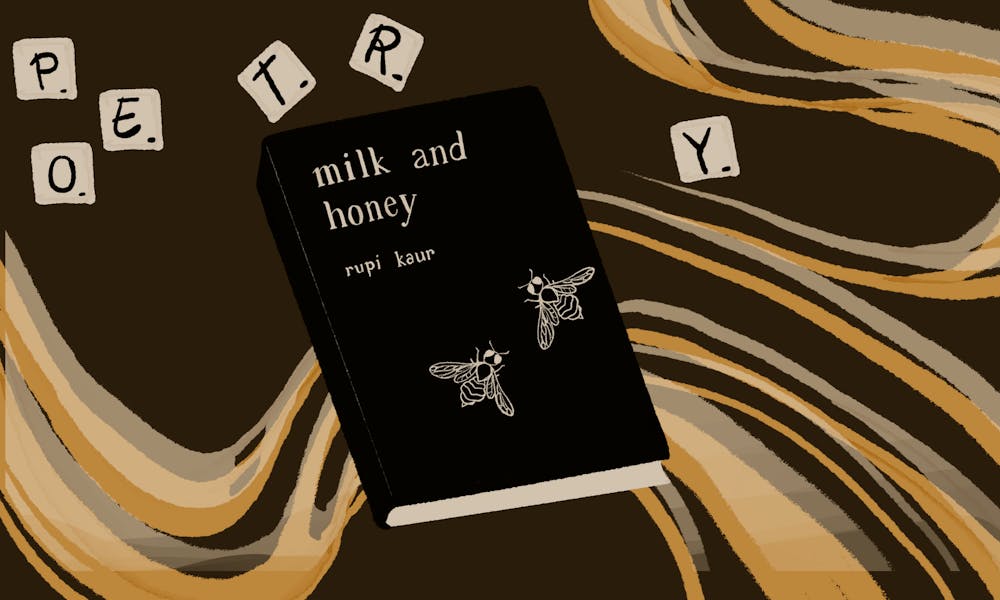“Truth is like poetry. And most people f*cking hate poetry.”
–Overheard in a Washington, D.C. bar
But do we really “f*cking hate poetry?"
As much as everyone likes to complain about assigned Shakespeare readings and English projects that require deciphering any semblance of meaning from Wordsworth and Dickinson, we are all poetry lovers at heart. Don’t believe me? What do your Spotify Wrapped stats say about your music listening habits?
Poetry is all around us—shrouded in rap, TikTok, Broadway fandoms, even unintentionally lyrical quotes critiquing poetry in The Big Short. But beyond the underlying poeticism embedded within our culture, 2021 started off with a poetic bang. One of the highlights from President Biden’s inauguration this past January was National Youth Poet Laureate Amanda Gorman’s poem “The Hill We Climb.” In her speech, Gorman addressed a turbulent America with words of hope that emphasized America’s commitment to “all cultures, colors, characters and conditions of man.” Gorman’s inspiring words not only set a precedent for the president’s agenda regarding social justice issues, but also offered a unifying message for marginalized communities across America—proposing a legacy of love for all our endeavors.
Amanda Gorman is at the forefront of a new literary era, one that aims at giving voices to women and members of the BIPOC community. Within our culture's renewed poetic interest, eclectic genres and styles have been emerging. One of the pioneers in the trending raw feminist style of "pop poetry" is Rupi Kaur. The Indian-born Canadian poet self–published her first book milk and honey when she was only 21.
Kaur’s creative writing professors in college told her not to bother when she inquired about publishing her first poetry book. “I was told it was too difficult,” Kaur explained to fans. “They said poetry basically never got published.” Now, at 28, Kaur’s three books milk and honey, the sun and her flowers, and home body have sold over eight million copies. Kaur’s poetry focuses on the female identity, migration, sexual abuse, and healing. Her most recent book published last November, home body, was a New York Times bestseller this past Christmas season, along with her two other books.
Other modern writers contribute to the trending "bare–bones" poetry style. One of Kaur's inspirations is Nayyirah Waheed, a self–dubbed "quiet poet" whose sentimental poetry has provided inspiration for millions. Not only are Waheed's books salt. and nejma well regarded, but her words have soaked into the feminine self–love movements on social media. Waheed's succinct and raw writing style makes her poetry prime for Instagram and Twitter circulation. The tag #nayyirahwaheed has nearly 90k posts, delving into topics of femininity, race, and self–acceptance.
Yrsa Daley–Ward is another young poet well known from her social media platforms. The former British model explores gritty avenues of the female experience, including mental health, sexuality, adolescence, and self–discovery. Daley–Ward has attracted the attention of many famous writers, including Nayyirah Waheed and songwriter Florence Welch. Her poetry collection bone and book The Terrible: A Storyteller's Memoir offer relentless exposures of truth which attract women of all backgrounds seeking the consolation of an honest narrator.
In the wake of the #MeToo Movement, society is progressively becoming more receptive of unabridged female expression. Poetry provides the foreground for voices that have been ignored for far too long, including stories of oppression, sexual violence, and subjugation. Many young female poets of the 21st century bring raw storytelling styles to the genre, relating to younger audiences by disregarding capitalization and strict rhyming schemes. These artistic aspects, when paired with stream–of–consciousness writing, create a sense of vulnerability and self exposure, a ruggedly raw feeling that is often lacking in the tongue–twisting riddles of poetic “greats” like T.S. Elliot and Edgar Allan Poe.
In my experience, people who claim they “f*cking hate poetry” have only been exposed to the common–core classic poets introduced in high school—many of whose lyrical sayings are often disconnected from the average Gen Z student, especially those who are not white and male. But with the increase in the publication of diverse poetic voices, more and more people are beginning to feel like they are finally being heard.
Other established artists have been adding to the newly popularized genre of feminine "pop poetry." Once deemed an unsuccessful pursuit by Kaur’s college professors, poetry books are all the rage in 2021, gaining particular prominence thanks to celebrities’ publications. Poetry can be used as a medium for autobiographical and narrative storytelling. Composing a book of individual poems as opposed to individual publications provides a more holistic approach to reflecting an artist’s creative momentum.
Singer–songwriters Lana Del Rey and Halsey contributed their own collections to the recent surge of poetry books this past fall. Lana Del Rey’s Violet Bent Backwards Over the Grass is an intrinsic exploration of authenticity and falsity, combining original poetry and photography by the singer–songwriter. Del Rey’s collection includes cross–outs, white–outed lines, and rewrites to add to the unrefined realism of her prose. Similar in her genuine sentimentality, Halsey’s I Would Leave Me If I Could reads like a diary, unafraid to admit her unabridged thoughts, insecurities, and heartfelt longings.
Although distinct in their experiences, voices, and underlying messages, the leading female figures in pop poetry are paving a new path for women to express themselves. The current trend of enduringly explicit storytelling mixed with a flare of femininity offers a fresh avenue for reflection and self–exploration. Acknowledging the darkness of humanity while simultaneously reveling in our persistent survival—that is what we savor from the many flavors of pop poetry: a taste of the new with a tragically nostalgic remembrance of the past. These modern poets don’t flaunt their literary brilliance, over–embellish their diction, or stupefy their audiences with superfluous metaphors; rather, they devolve right into the heart of the matter by doing something much more courageous—telling the truth. And if truth really is like poetry, perhaps we should consider reading a bit more of it.







